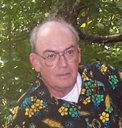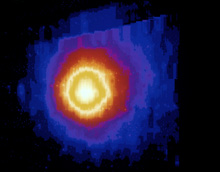I have not seen the movie, "The Wonder of It All", but it sounds like I should.
Others have mentioned that they had and my thanks to Ron for his
review as presented at The Space Review.
A snip below, but do go read.
Let me know what you think if you have seen the movie.
- LRK -
I think the more publicity of our past missions to the Moon the better
and hopefully we will see more to come.
Where will the future take us?
Nations have started back to the Moon and maybe we will see some space
type commerce in the future as well.
Here around Earth we now have communications satellites that were
predicted by Arthur C. Clarke and think nothing of it.
- LRK -
At NSS Space Settlement page http://www.nss.org/settlement/ we have this.
--------------------------
"Clarke's Law"
Arthur C. Clarke, inventor of the concept of using geosynchronous
orbit for communication satellites, once wrote that new ideas like
this pass through three stages:
* Stage 1: "It can't be done."
* Stage 2: "It probably can be done, but it's not worth doing."
* Stage 3: "I knew it was a good idea all along!"
When Clarke first published his idea of utilizing geosynchronous orbit
in 1945, that idea was in Stage 1 because it was technically
impossible to do so at the time. Today, of course, that idea is in
Stage 3, and our television programming and phone calls routinely go
through geosynchronous satellites.
--------------------------
And at http://www.lsi.usp.br/~rbianchi/clarke/ACC.Laws.html we see this.
--------------------------
In the book Profiles of the Future: An Inquiry into the Limits of the
Possible Arthur C. Clarke states his three Laws, which are formulated
as follows:
Clarke's First Law:
"When a distinguished but elderly scientist states that something is
possible he is almost certainly right. When he states that something
is impossible, he is very probably wrong."
Clarke defines the adjective 'elderly' as :"In physics, mathematics
and astronautics it means over thirty; in other disciplines, senile
decay is sometimes postponed to the forties. There are of course,
glorious exceptions; but as every researcher just out of college
knows, scientists of over fifty are good for nothing but board
meetings, and should at all costs be kept out of the laboratory". (in
Profiles of the Future.)
Clarke's Second Law:
"The only way of discovering the limits of the possible is to venture
a little way past them into the impossible."
Clarke's Third Law:
"Any sufficiently advanced technology is indistinguishable from magic."
--------------------------
If you stop in at the KurswellAI net
http://www.kurzweilai.net/meme/frame.html?main=/articles/art0361.html?
you will find:
--------------------------
Arthur C. Clarke Offers His Vision of the Future
by Sir Arthur C. Clarke
Ray Kurzweil
The science fiction visionary behind HAL offers his predictions of
salient events to come in this century.
--------------------------
It was exciting back in the 70's to watch us go to the Moon.
http://history.nasa.gov/alsj/frame.html
It is exciting to watch it again on DVDs from Spacecraft Films.
http://www.spacecraftfilms.com/
It should be even more exciting to watch us develop the Moon today and
on to Mars tomorrow.
[Unless congress kills our going to Mars keeps us here in the crib.]
http://www.thespacereview.com/article/998/1
- LRK -
Thanks for looking up with me.
Larry Kellogg
Web Site: http://lkellogg.vttoth.com/LarryRussellKellogg/
BlogSpot: http://kelloggserialreports.blogspot.com/
RSS link: http://kelloggserialreports.blogspot.com/atom.xml
Newsletter: https://news.altair.com/mailman/listinfo/lunar-update
==============================================================
http://www.thespacereview.com/article/996/1
Review: The Wonder of It All
by Ronald A. Wells
Monday, November 12, 2007
As the national interest slowly turns towards a deeper human
penetration into space, settlements on the Moon with later expeditions
to Mars are becoming more of a reality show than political leadership
of the past 35 years would belie This growing interest in space
received a huge boost a decade ago with the landing of a small robot
vehicle on Mars and from increasingly sophisticated Mars orbital
mapping spacecraft launched by NASA and later by ESA. An even greater
impetus stimulated the public's appetite about our neighboring worlds
when NASA landed two golf-cart sized rovers on opposite sides of Mars
in January 2004 which sent back thousands of photographs of their
treks across the surface. They are still roving and transmitting
pictures and data today, having recently survived one of the worst
dust storms since their arrival on the planet almost four years ago.
And the Vision for Space Exploration, as announced by President Bush
in January 2004, is intended to "�extend [a] human presence across the
solar system, starting with a human return to the Moon by the year
2020".
Although not greatly visible on the national public stage today as
they once were in the late 1960's and early 70's, an almost-forgotten
group of American heroes, the Apollo astronauts who traveled to the
Moon, including the scant dozen of them who walked on the surface for
times ranging from a few hours to three days, also returned to center
stage as actors about a decade ago in the cable TV series "From the
Earth to the Moon". The crew of Apollo 13, again as actors, was
featured in a movie by that name; and a special TV documentary,
"Failure Is Not an Option", narrated by Gene Kranz, the chief flight
director during the Apollo period, recounted the excitement of each of
the lunar missions with archival footage of actual events. Transcripts
of voice communications with the two Moonwalkers on each of the six
landed missions, together with supplementary photographs, mission
reports and related materials were provided by the Apollo Lunar
Surface Journal. Various books by and about the astronauts have also
been published.
But none of these media sources really bring to life the men
themselves who went to the Moon and walked on its surface. Two recent
productions have attempted to redress that situation: Jeff Roth's The
Wonder of it All and Duncan Kopp and Chris Riley's In the Shadow of
the Moon (see "Review: Two Shadows on the Moon", The Space Review,
September 24, 2007). It is worthwhile in this discussion, however, to
draw a few distinctions between the two because they approach their
subjects differently.
Snip
==============================================================
http://www.thespacereview.com/
Sustaining exploration: communications, relevance, and value
I---
It has become fashionable of late to critique and criticize NASA's
communications efforts, especially given the belief by many that NASA
has not done a good enough job communicating the importance of space
exploration to the general public. In the first of a two-part
report, Mary Lynne Dittmar argues that such criticism is focused too
much on tactics rather than broader strategic concerns.
http://www.thespacereview.com/article/1000/1
Exploding Moon myths: or why there's no race to our nearest neighbor
---
Recent and upcoming lunar missions, and even announcements of
proposed missions, have given the impression to some that there is
some kind of new race to the Moon developing. Dwayne Day find the
flaws the various explanations given for why these missions are all
taking place now.
http://www.thespacereview.com/article/999/1
Why "Save Mars" is worth the effort
---
Some space advocates have been pressing Congress to drop language in
the House version of the NASA budget that would prohibit spending on
any project exclusively intended to support human Mars exploration.
Chris Carberry explains why what appears to be a minor provision in
the overall bill is so critical.
http://www.thespacereview.com/article/998/1
Hillary Clinton's civil space policy
---
As the only presidential candidate of either party to release a
detailed science policy, Hillary Clinton's approach to space policy
has come under scrutiny. Taylor Dinerman examines what Clinton said
-- and did not say -- and its implications for the agency and its
exploration plans.
http://www.thespacereview.com/article/997/1
Review: The Wonder of It All
---
As a new generation of space exploration ramps up, there is a renewed
interest in that original generation of space explorers. Ron Wells
reviews the lesser-known of two new documentaries about the Apollo
astronauts and examines what sets it apart in its examination of the
only people to have walked on another world.
http://www.thespacereview.com/article/996/1
Snip
==============================================================
http://www.breitbart.com/article.php?id=071112234943.9wthyh4c&show_article=1
Russia, India to join in moon mission
Nov 12 07:49 PM US/Eastern
Copyright AFP 2007, AFP stories and photos shall not be published,
broadcast, rewritten for broadcast or publication or redistributed
directly or indirectly in any medium
Thanks for the link as passed by Bob MacBird, Conroe, Texas
Snip
==============================================================
WHAT THE MIND CAN CONCEIVE, AND BELIEVE, IT WILL ACHIEVE - LRK
==============================================================
Many folks would like to see us back on the Moon and developing its resources.
Monday, November 12, 2007
Subscribe to:
Post Comments (Atom)





No comments:
Post a Comment
Note: Only a member of this blog may post a comment.